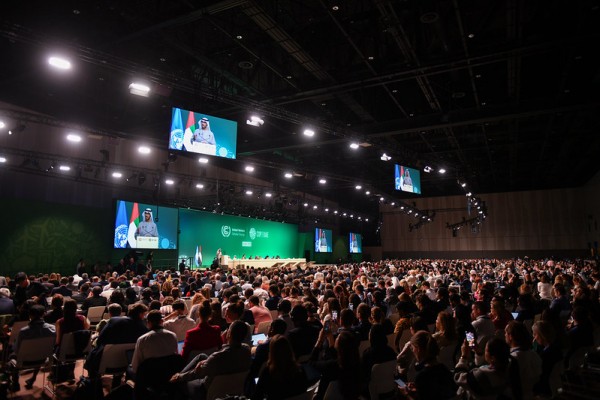GEOG Scholars Share Insights Into Geospatial Research, Sustainable Agriculture at COP28
Leaders, policymakers, and scientists from all over the world recently convened for climate negotiations at the United Nations’ 28th annual climate change conference—commonly referred to as the “Conference of the Parties” (COP28)—in Dubai, United Arab Emirates. Among those present, both in-person and virtually, were three researchers from the Department of Geographical Sciences: George Hurtt, Molly Brown and Michael Humber:
For the second year in a row, Professor and Associate Chair George Hurtt participated in the conference, having contributed to the 2023 Global Carbon Budget, a key annual report on trends in global carbon emissions. Hurtt presented virtually on the panel “Earth Observations in Support of Mitigation Actions Towards the Paris Climate Goal and Sustainable Development Goals (SDGs),” organized by the USRA National Institute for Environmental Studies. He shared some of the latest work produced by the NASA Carbon Monitoring System focusing on forest carbon for mitigation baseline, future planning and assessment.
“Presenting at COP is an honor and a great example of science informing policy, a hallmark of the work being done in our department,” said Hurtt, who is also the science team leader of the NASA Carbon Monitoring System.
Research Professor Molly Brown attended her third COP representing her agricultural technology company 6th Grain, which transforms weather data into decision-support tools for smallholder commercial farmers across Africa and South America. She participated in Google’s roundtable “Startup for Sustainable Development;” moderated a panel at an AGFUND gala dinner; and also participated in the panel “Sustainable Finance Solutions for Food Security and Agricultural Resilience in the Face of Climate Change,” organized by AGFUND, the UN Convention to Combat Desertification (UNCCD) and The Arab Bank for Economic Development in Africa (BADEA).
“At these COP events, I reminded these institutions of the importance of geospatial data as a tool in their work to support smallholder farmers across Africa,” pointed out Brown, who attended the event in person.
Associate Research Professor Michael Humber presented his views on farm data collection, usage and policy at a side event focusing on sustainable agriculture in the Americas, as part of the Home of Sustainable Agriculture of the Americas pavilion organized by the Inter-American Institute for Cooperation on Agriculture (IICA) and chaired by Solutions from the Land. His talk focused on how farmers’ and researchers’ attitudes toward data sharing and data policy vary across space, and how those attitudes are reflected in the work of NASA Harvest at the global level, NASA Acres in the United States, and in the UMD Grand Challenges project at the state-level.
"The COP is a good reminder that we need buy-in from the global community to tackle big issues like climate change and sustainability, and that the best way to approach that is by designing solutions that benefit everyone throughout the value chain," Humber said.
As COP28 concludes, the Department's role in addressing challenges related to geospatial solutions, sustainable agriculture and climate policy remains a noteworthy contribution to the ongoing global conversation on climate change.
Image: General view during the Closing Plenary at the UN Climate Change Conference COP28 at Expo City Dubai on December 13, 2023, in Dubai, United Arab Emirates. (Photo by COP28 / Anthony Fleyhan)
Published on Thu, 12/14/2023 - 11:43


